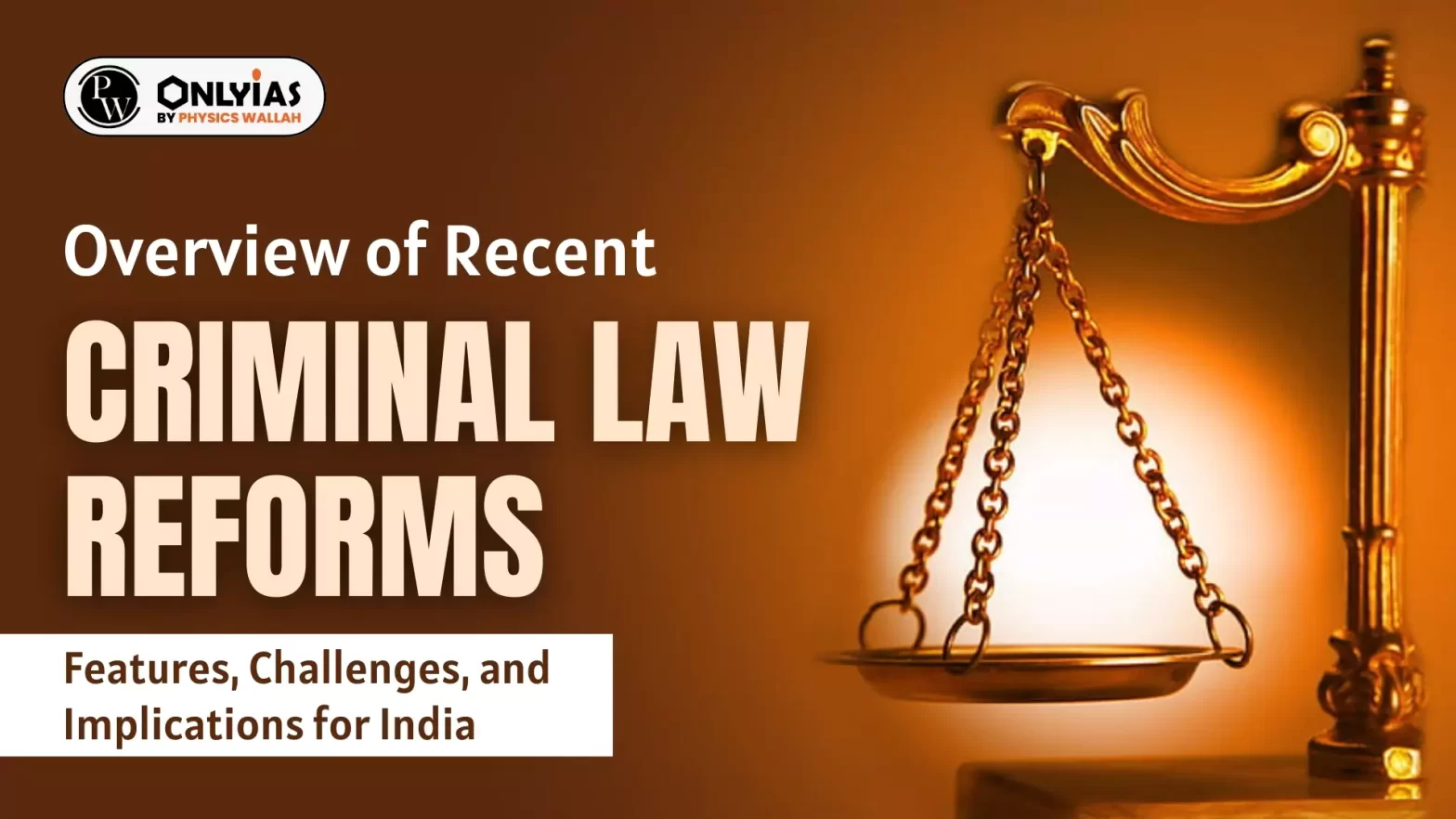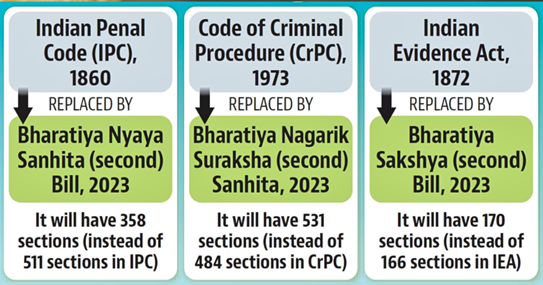According to recent Union Home Ministry notification, three recently passed criminal law reforms will be enforced from July 1, 2024.

According to a recent Union Home Ministry notification, three recently passed criminal law reforms will be enforced from July 1, 2024.
The Criminal laws – the Bharatiya Nyaya Sanhita, the Bharatiya Nagarik Suraksha Sanhita and the Bharatiya Sakshya Act – got the Parliament’s approval on December 21, 2023, during the winter session and President’s assent on December 25, 2023.
These laws will replace the British-era Indian Penal Code, the Code of Criminal Procedure and the Indian Evidence Act of 1872.

Recent Committee on Criminal Law Reforms |
Suggested Reforms |
Ranbir Singh Committee
|
|
Earlier Committees on Criminal Law Reforms |
Suggested Reforms |
| Madhav Menon Committee on Reforms in the Criminal Justice System (2007): This committee drafted a national policy paper on criminal justice reforms in India, focusing on issues like witness protection, sentencing, and judicial administration. | Social Welfare Offences Code (SWOC):
Correctional Offences Code (COC):
Penal Code (PC):
Economic Offences Code (EOC):
|
| Malimath Committee: Officially known as the Committee on Reforms of Criminal Justice System, was a committee appointed by the Government of India to review the criminal justice system in the country. | Police Reform:
Job of Judges:
Bail Arrangements:
Condemning Rules:
Witness Security:
Utilisation of Plea Bargaining:
juvenile justice laws
|
Features of New Criminal Law Reforms
Features |
Existing Laws (IPC, CrPC, IEA) |
New Criminal Laws: (BNS, BNSS, BSB) |
Key Changes in New Criminal Laws |
| Scope of Offences | IPC defines various crimes. | BNS aims to simplify and clarify offences, categorising them into minor, major, and heinous. | Potential for clearer sentencing guidelines and easier understanding of crimes. |
| Investigation & Trial Procedures | CrPC outlines procedures for investigation, trial, and appeals. | BNSS focuses on speedy trials, witness protection, and victim assistance. | Aims to reduce delays, improve witness protection, and offer a victim-centric approach. |
| Evidence Admissibility | IEA determines what evidence is admissible in court. | BSB proposes stricter standards for electronic evidence and introduces “judicial discretion” for certain evidence. | Potential for tighter control over electronic evidence and more flexible handling of sensitive information. |
| Punishment & Sentencing | IPC prescribes punishments for various offences. | BNS introduces tiered sentencing based on offence severity and mitigating factors. | Potentially fairer sentencing and increased focus on rehabilitation for minor offences. |
| Focus on Rights & Safeguards | All laws contain provisions for due process and fundamental rights. | BNS and BNSS emphasise legal aid, community policing, and restorative justice mechanisms. | Potential for better access to legal representation, community involvement in crime prevention, and victim reparation. |
| Technology Integration | Existing laws lack comprehensive provisions for technology. | BNS and BSB address cybercrimes, digital forensics, and electronic evidence handling. | Aims to better address modern forms of crime and utilise technology for efficient investigations. |
This extension raises concerns about potential violations of civil liberties, as it expands the maximum limit from 15 days to either 60 or 90 days, depending on the nature of the offence.
India’s criminal laws have developed through centuries, shaped by indigenous legal customs, foreign intrusions, and colonial influences. The legal framework is in a constant state of evolution, adapting to contemporary challenges while safeguarding principles of justice, fairness, and human rights.
Reforms are integral to this process, ensuring the legal system remains responsive to the needs of a dynamic society. In this ongoing journey, India strives to reconcile historical influences with a commitment to uphold fundamental values in the pursuit of a just and equitable legal landscape.
MCQs
1. Which committee was constituted by the Ministry of Home Affairs to review the three codes of criminal law, and who headed this committee?
2. What is one of the challenges mentioned in the new bills regarding police custody durations?
3. What is a potential concern associated with the proposed changes in offences related to state security in the new bills?
Answers:
1. C) Madhav Menon Committee, headed by Dr. Ranbir Singh
2. C) Extension of possible police custody durations
3. A) Overcriminalization and wider police powers
| Must Read | |
| NCERT Notes For UPSC | UPSC Daily Current Affairs |
| UPSC Blogs | UPSC Daily Editorials |
| Daily Current Affairs Quiz | Daily Main Answer Writing |
| UPSC Mains Previous Year Papers | UPSC Test Series 2024 |
The bills are Bharatiya Nyaya (Second) Sanhita, Bharatiya Nagarik Suraksha (Second) Sanhita, and Bharatiya Sakshya (Second) Bill.
They intend to replace the Indian Penal Code (IPC), Code of Criminal Procedure (CrPC), and Indian Evidence Act (IEA) respectively, aiming for a comprehensive overhaul of India's criminal justice system
They call for "judicial discretion" for certain sensitive information, tighter electronic evidence standards, and tiered sentencing.
While some applaud the modernization efforts, others voice concerns regarding the possibility of power abuse, the weakening of existing safeguards, and ambiguous provisions.
The board of trustees was framed to survey the three codes of criminal regulation in India.
The Service of Home Undertakings gave a notice on May 4, 2020, comprising the board, and it was led by Prof. (Dr.) Ranbir Singh, the previous Bad habit Chancellor of Public Regulation College (NLU), Delhi.
<div class="new-fform">
</div>